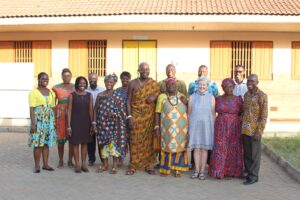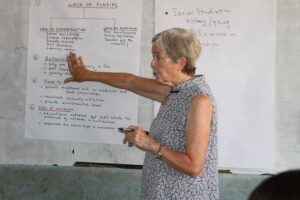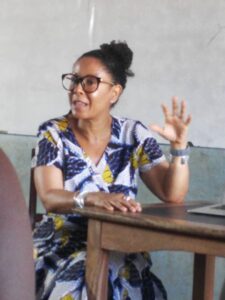Engaged Anthropology Grant: Rachel Engmann

In 2014 Rachel Engmann received a Post-Ph.D. Research Grant to aid research on ”Slavers in the Family: The Archaeology of the Slaver in Eighteenth Century Gold Coast”. In 2018 Dr. Engmann had the opportunity to return to her fieldsite when she received an Engaged Anthropology Grant to aid engaged activities on “Excavating Knowledge”.
The Wenner-Gren Engaged Anthropology Grant funded a fact-finding workshop and interviews in order to develop educational materials as part of a community outreach project based on the Wenner-Gren sponsored research, ‘Slavers in the Family’ at Christiansborg Castle, conducted under the auspices of the Christiansborg Archaeological Heritage Project (CAHP). Christiansborg Castle is a UNESCO World Heritage Site, is aC17th century former European trading post, Danish and British colonial seat of government and Office of the President of Ghana. An engaged approach to archaeological heritage directed at primary and secondary students is in keeping with the project’s philosophies since CAHP represents an engaged, participatory-orientated approach to archaeological heritage.
Activities:
- Consultations
We first held consultation meetings with the relevant stakeholders in order to inform them about the CAHP research project, plans for educational outreach and extend an invitation to participate in the workshop itself.
- Workshops
We conducted two workshops in May 2018 in a primary school in the Osu district of Accra, and close to Christiansborg Castle. The attendees comprised teachers and head teachers, mostly from the public school sector but also from a mission school; representatives from the Ghana Museums and Monuments Board; a local Chief and two Queen Mothers.

The CAHP Director gave a brief introduction to the archaeological excavation project at the castle. The CAHP Education Director (facilitator) then explained that the proposed outreach materials had been inspired by the project: the primary materials would serve as an introduction to archaeology; the secondary materials would draw out the connection between archaeology and heritage. They would be based upon the concept of active learning: the teacher or the community based volunteer would lead the students on a voyage of guided discovery with materials that could be downloaded from the CAHP website. Any associated tangible materials would be available at minimal cost from students’ homes or the local market. The focus would be upon real student involvement in the learning process through a variety of activities involving exploration and collaboration, questioning and discussion – skills that would be transferable to other disciplines across the curriculum. And the results might be expressed in various media: for example creative writing, poetry, art and drama. The facilitator then gave the participants a ‘taster’ of the proposed materials at primary and secondary levels. The presentation was very well received and all present were keen to learn and experience more of the proposed materials.
The attendees were then invited to identify the challenges facing the implementation of these materials, and to consider possible solutions to those challenges.
- Interviews
The CAHP Project Director and Education Outreach Director also conducted interviews with parents, caregivers and children in the area close to the castle – one of the most impoverished areas in Accra – in order to get a better understanding of the challenges they face regarding the Ghana government education system and to inform the development and implementation of our outreach materials.
Summary

CAHP’s proposed active learning outreach materials will make a positive contribution to the curriculum and to the introduction of a new pedagogy in both primary and secondary schools in Ghana. The current pedagogy is very much ‘chalk and talk’ because this is how teachers are trained. There is also an acute lack of textbooks. There are no other resources (teachers often have to purchase them out of their low salaries). Together, these factors result in very poor exam results. Our materials will help to address all these issues. With these low cost resources, teachers will be motivated to teach more imaginatively and effectively, and students themselves will be motivated to discover and learn more, because they will realize that learning can be fun! Volunteers in the community can also use these materials to work with and help educate students who do not attend school, or do not attend school regularly for financial reasons.
We will need to provide in-service training for teachers and volunteers in the community around the implementation of active learning, including study skills. And we will need to provide hard copies of the materials for those teachers and volunteers who do not have access to the CAHP website.
We will need to seek further funding to create and develop the project and its implementation.